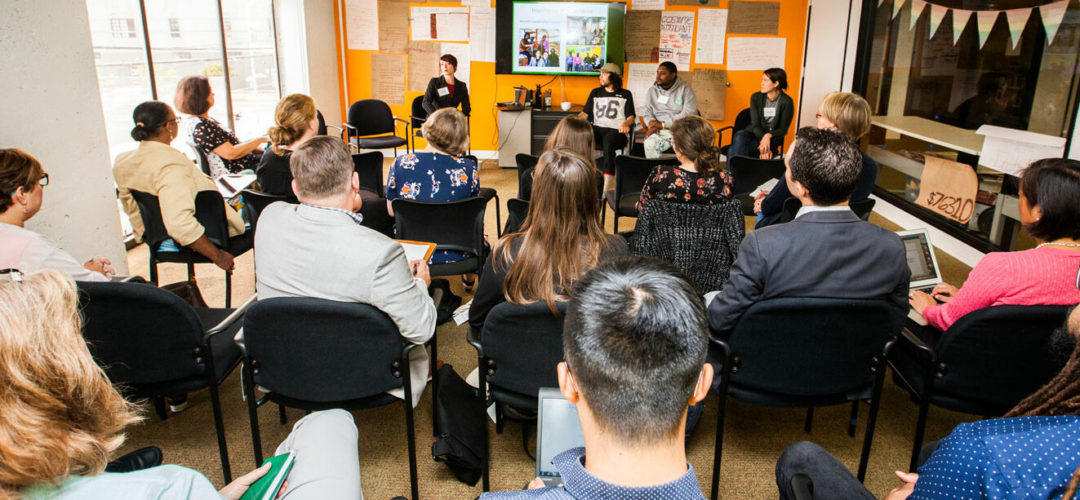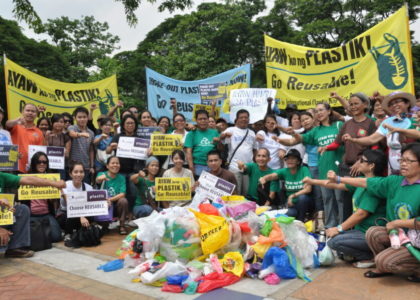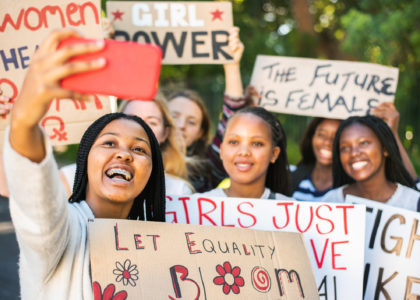The Transformative Power of Listening: An Interview with Fund for Shared Insight
October 04, 2022
 As part of Rockefeller Philanthropy Advisors’ commemoration of 20 years, we are featuring in depth profiles of key sponsored projects. Fund for Shared Insight (“Shared Insight”) is a national funder collaborative seeking to improve philanthropy by promoting high-quality listening and feedback in service of equity. Shared Insight promotes and supports ways foundations and nonprofits listen and respond to the people and communities most harmed by the systems and structures they are seeking to change.
As part of Rockefeller Philanthropy Advisors’ commemoration of 20 years, we are featuring in depth profiles of key sponsored projects. Fund for Shared Insight (“Shared Insight”) is a national funder collaborative seeking to improve philanthropy by promoting high-quality listening and feedback in service of equity. Shared Insight promotes and supports ways foundations and nonprofits listen and respond to the people and communities most harmed by the systems and structures they are seeking to change.
RPA spoke with Managing Director Melinda Tuan for an interview on the work that Shared Insight does. Melinda discussed the origins of Fund for Shared Insight, the importance of listening and feedback in philanthropy, and the initiative’s plans for the future. This interview has been edited for length and clarity.
What was the impetus for creating Fund for Shared Insight, and how has your background contributed to its strategic direction?
In 2013, the Hewlett Foundation was looking to see how they might spend resources to improve the field of philanthropy. They had conversations and convenings with other funders and found eight foundations that wanted to join the as-yet-unformed initiative. Those funders create a pooled fund at Rockefeller Philanthropy Advisors (RPA) and began thinking about what changes they would like to create in the sector.
They agreed that foundations are not particularly good at connecting with the people and communities most impacted by systemic racism and structural inequities, nor in acting on what they hear from those people and communities. We in philanthropy are often so far away (literally and figuratively) from the people and communities ultimately being impacted by the work that we fund. So that was the problem the collaborative decided to focus on.
I was hired in 2014 to support the effort. Prior to that, I had been doing philanthropic consulting since 2003 and had run a social venture fund in San Francisco. I had worked with a number of the eight funders, and they were familiar with my work. Between July 2014 and December 2014, we named the initiative Fund for Shared Insight and came up with three open national RFPs around feedback practice among nonprofits, feedback, and foundation openness, which are practices around hearing feedback and sharing what is learned. We had 185 proposals come in. We had a board meeting with the funders in November, voted on those proposals, made 14 grants, and RPA helped us get them out the door by December. Things moved very fast, but it was a wonderful experience, and it has been a joy to support and grow the collaborative.
If you fast forward to today, we’re now in our third three-year phase, with 10 core funders and more than 150 funders in total.
You settled on this area because funders lacked skill in it. Have you seen an improvement in funders’ ability and desire to listen and act on what they hear?
In 2014, a lot of funders agreed that it was important to listen, but there wasn’t much emphasis on being equity-centered in that conversation. The racial reckoning in the U.S. after George Floyd’s murder really propelled this work as philanthropies committed to being more equity-centered in their work. There was more of a recognition that we must engage with the different populations that are most impacted by philanthropy yet least consulted in their efforts.
We’ve had a lot of interest in our work, and I think that is why we have 150-plus funders that’ve been engaged in our work to date. Yet we know philanthropy is sometimes quite slow to change. These practices that we’re talking about — building that muscle around listening — take time to develop. It requires experimenting with ways that are authentic and building those capacities in meaningful ways. We talk a lot in our field about being non-extractive, and that applies to how we listen. We’re trying to develop meaningful connections with people and communities, to shift and share power with community, so that people are better off in ways they define for themselves. Philanthropy is not just sitting in an ivory tower with strategies informed by academic experts, but it requires valuing the lived expertise of people and communities that are most impacted.
Fund for Shared Insight stresses the importance of feedback and creating effective feedback loops. Can you provide an example of how funders can operationalize feedback loops in their work?
It’s important to first explain what we mean by feedback loops. When we give talks at philanthropy conferences, we often ask, “How many of you have taken a survey recently from an airline, a hotel, a restaurant, etc.?” Most people raise their hands. We then ask, “Do you ever hear back from them?” There are usually very few hands. That is the issue that feedback loops try to address. Soliciting feedback should be framed as a loop in which an organization takes in feedback but also must do something with it.
There are five steps to creating an equity-centered feedback loop. First you must design the way to collect the feedback and engage the communities in that design effort. Then you collect the data, making sure to do so in an inclusive way. The third step is to analyze the data. This involves engaging the people who gave the feedback in interpreting that data. The fourth step of a high-quality feedback loop is responding to the data by making changes based on the feedback. The fifth step, which is the most important part and often the hardest, is to close the loop. Which is saying, “Here’s what we heard, and here’s what we’re doing about what we heard.”
We want to see funders change the way they make their grants and develop strategies around grantmaking and, ultimately, their governance based on feedback that’s collected in these high-quality ways. On our website, we have a “Funder Action Menu,” which is a living, breathing resource that identifies different ways that funders can listen to people and communities.
Some of this listening may be intermediated through nonprofits. Our signature initiative, Listen4Good, is a capacity building program for direct-service nonprofits. We have more than 700 nonprofits across the country that are using Listen4Good, and collectively they have listened to almost 200,000 individuals who are clients of organizations across the country. We have a team of a dozen coaches that provide virtual assistance to participating organizations through one-on-one consultations and peer support.
Listen4Good is another way that funders can engage in this work, by supporting their nonprofit partners to use the tool, and then listen to what people say intermediated through the nonprofits.
For well-intentioned funders, where do you see the biggest block to employing some of these tools and techniques effectively?
In our work, we’ve seen funders point to resource allocation as a main barrier to our services. Funders need to be willing to invest money and time into building out their capacity to listen. We’ve had funders tell us that they don’t have a line item for capacity building, or that their board doesn’t believe in capacity building. Whether it’s hiring people who have lived expertise onto their staff, incorporating feedback into their grantmaking process, or shifting the way their strategies are developed, all of this requires an openness to change and actual action.
As an organization that is hoping to shift power structures within philanthropy, how have you measured the effectiveness of your work?
Early on we engaged an evaluation partner, ORS Impact, which has been embedded in Fund for Shared Insight. We convene our core funders three times a year in person, and ORS helps us assess how well we are achieving our theory of change.
To measure our effectiveness, we look at our theory of change. Are there more nonprofits that are listening in high-quality ways to the people and communities they serve? Are foundations building their muscle around listening and high-quality feedback? Are we building the field to support these efforts of both nonprofits and foundations? We also must assess our funders themselves: are the 10 core funders that comprise Fund for Shared Insight changing? Are they listening? Are they employing these different strategies? We can’t do this work without looking at ourselves as well.
And what have been your findings about how the core funders are changing?
We have tangible examples of our funders enabling their nonprofits to listen, hiring people with lived experience, and employing participatory grantmaking efforts to shift and share power with community. We have fewer examples of listening informing strategy development within the foundations. And there are very few examples of funders that have truly shifted power by engaging members from the community to be on their boards, making decisions about where funds and strategies are directed.
Have you seen grantees improve listening with the communities that they’re serving?
Yes, not surprisingly, we’ve seen more widespread adoption of high-quality listening and feedback processes among direct-service nonprofits. In addition, we’ve seen similar dynamics within nonprofits that we see within our funders. They might realize as they encourage staff to listen to the community that they need to improve how they listen to their own staff. The staff are getting feedback on their performance from the community, but have never been able to give feedback to management at the nonprofit about their experience working at the organization.
So we see that when feedback loops are employed in one area, they can end up traveling into other areas, whether it’s listening to staff or volunteers or other stakeholders in the community. When high-quality feedback loops are implemented, equity can really spread across organizations.
It sounds like this process really opens people’s eyes to their own shortcomings and how they can improve.
We’ve seen that it encourages people to be more vulnerable. It’s hard to ask for feedback (no one likes receiving negative feedback), and it can be difficult to close the loop on feedback that is not positive. I think the key to turning negative feedback into a positive experience is humility. So many of us seek to be perfect at what we do; it’s not possible to be excellent all the time. This process helps us be open to all that we are learning and offer grace to each other. We can own those things that we did well, but also be open to change.
When it comes to feedback, openness to hearing and providing authentic feedback, and openness to change, is a theme that runs through all our work. Without that openness to hearing hard things, how are you going to change or create a culture that supports change? Through Listen4Good, we’re asking nonprofits to be open to hearing that feedback and make changes based on that, and have funders be open to fund the kinds of improvements that make life better for people in ways they define for themselves.
How has the collaborative structure impacted your work? What challenges have come along with working within a collaborative?
Being a part of a funder collaborative has been a very joyful experience. When we started in 2014, we wanted to establish a sense of equality. If one foundation was providing $2 million a year and another was providing $250,000 a year, they still each got one vote. We wanted to minimize the power dynamic among funders.
Being a funder collaborative has allowed us to experiment and innovate in ways that individual funders around the table probably could not. A collaborative gives some cover to individual foundations, letting them really experiment and learn about areas such as equity, diversity, and inclusion and participatory grantmaking. Back when we started, there were some funders around the table who had never had conversations around equity, diversity, and inclusion at their institution. It allowed those individual foundations to bring those conversations and learnings back to their home institutions and share. Because we are a funder collaborative, we can move more quickly, get dollars out the door with RPA’s help, and fund entities that typically wouldn’t qualify for funding, as we have done through our participatory grantmaking initiative.
In terms of challenges, there are a couple core funders that only fund in the U.S. It can be challenging that some of our funds can’t go to international work. It has not been a huge roadblock because we have plenty of work to do in the U.S., but it is something we must be mindful of.
What are Fund for Shared Insight’s overarching goals for the future?
We have a very extensive document with our theory of change that has all the short-, medium-, and long-term outcomes that we seek in each of the five areas of our work. One of these is to see the field embrace listening as part of what foundations consider to be effective practices. We will continue working with key philanthropy organizations to make sure that these principles and practices around equity-centered high-quality listening are embedded in their programming, communications, and conferences. We’re hoping that one day this work around high-quality feedback and listening is fully mainstreamed throughout the social sector.
Photo credit: Fund For Shared Insight, https://fundforsharedinsight.org/listen4good/
Back to News



